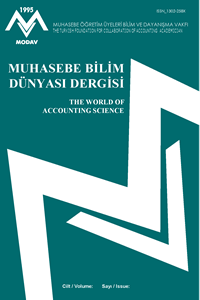Abstract
Homo economicus, insanın rasyonel düşünen
ve davranan bir varlık olduğunu, ekonomik çıkarlarını en üst düzeyde sağlamak
amacıyla hareket ettiğini ifade eden bir iktisat kavramıdır. Daniel
Defoe’nun, 1719’da, Adam Smith’ten uzun yıllar önce yarattığı Robinson Crusoe
karakteri, kapitalizm öncesi bir homo economicus örneğidir
ve homo economicus’un davranış özellikleri genellikle Robinson Crusoe’ya atıfta
bulunularak öğretilmektedir. Robinson, sahip olduğu şeyleri hesaplayan, kaydeden ve
gelecekte oluşturacaklarını tahmin ettiği faydalara göre düzenleyen bir
figürdür. Bu bağlamda hem ekonomik hem de ahlaki hesaplamayı ve hesaplaşmayı
içeren muhasebesel düşünce ve muhasebe kayıtları, metaforik olarak kitabın
hemen hemen her sayfasında yer almaktadır. Bu çalışmanın amacı, Robinson Crusoe
özelinde 18. yy İngiliz edebiyatında muhasebe kavramlarının ve kayıt sisteminin
inandırıcılığı arttırmak ve gerçekliğe yakınlaşmak amaçlı kullanımını ve
muhasebe gibi bir üstyapı kurumunun ekonomik ilişkilerin biçimiyle olan bağlantısını
ortaya koymaktır.
References
- Bos, R. ten. 2003. “Business Ethics, Accounting and the Fear of Melancholy”, Organization, 10 (2), 267–285.
- Çetin, H. 2003. “Çatışma ve Diyalog Tartışmaları Arasında İki İnsan, İki Medeniyet (Hay bin Yakzan/Doğu-Robinson Cruose/Batı)”, Ankara Üniversitesi SBF Dergisi, 58 (2), 29-53.
- Defoe, D. 2010. Robinson Crusoe, Türkiye İş Bankası Kültür Yayınları, İstanbul.
- Filizler, F. "Antropolojik Kapitalizm: Bir Jared Diamond Eleştirisi” https://www.academia.edu/35833946/_Antropolojik_Kapitalizm_Bir_Jared_Diamond_ele%C5%9Ftirisi (Erişim Tarihi: 13.06.2019).
- Ghosh, P. 2006. “Robinson Crusoe, The Isolated Economic Man: Marginal Utility Theory, and the Spirit of Capitalism”, Max Weber Studies I, 71-99.
- Hymer, S. 1971. “Robinson Crusoe and the Secret of Primitive Accumulation”, Robinson Crusoe’s Economic Man: A Construction and Deconstruction (42-54), Routledge, London.
- Klamer, A. 2002. “Accounting For Social and Cultural Values”, De Economist, 150 (4), 453-473.
- Klamer, A. ve D. McCloskey. 1992. “Accounting as the Master Metaphor of Economics”, European Accounting Review, 1 (1), 145-160.
- Marshall, D. 2004. “Autobiographical Acts in Robinson Crusoe”, ELH, 71 (4), 899-920.
- Marx, K. 2011. Kapital I. Cilt, Yordam Kitap, İstanbul.
- Marx, K. ve F. Engels. 2008. The Communist Manifesto, The Floating Press.
- Novak, M.E. 1963. “Robinson Crusoe and Economic Utopia”, The Kenyon Review, 25 (3), 474-490.
- Saltoğlu, N. 2010. Robinson Crusoe: Defoe’s Deceptive Legend of Capitalism, Çankaya Üniversitesi Sosyal Bilimler Enstitisü, Yüksek Lisans Tezi.
- Schonhorn, M. 1991. Defoe’s Politics: Parliament, Power, Kingship, and Robinson Crusoe, Cambridge University Press, Cambridge.
- Sherman, S. 1996. Finance and Fictionality in the Early Eighteenth Century, Cambridge University Press, New York.
- Watson, M. 2017. “Rousseau’s Crusoe Myth: The Unlikely Provenance of the Neoclassical Homo Economicus”, Journal of Cultural Economy, 10 (1), 81-96.
- Weber, M. 2005. The Protestant Ethic and the Spirit of Capitalism, Routledge, London.
Details
| Primary Language | Turkish |
|---|---|
| Subjects | Business Administration |
| Journal Section | MAIN SECTION |
| Authors | |
| Publication Date | February 25, 2020 |
| Submission Date | November 3, 2019 |
| Published in Issue | Year 2020 Volume: 22 - Special Issue of MODAV's 16. International Conference on Accounting |
Cited By
HOMO ECONOMİCUSUN KÜRESELLEŞME EKSENLİ TÜKETİM PARADOKSU ve OLUŞTURDUĞU SORUNLAR
Stratejik ve Sosyal Araştırmalar Dergisi
https://doi.org/10.30692/sisad.1468277
Authorship
MBDD follows the guidelines in COPE Authorship Guideline to ensure fair recognition of contributions to a research paper (https://publicationethics.org/guidance/discussion-document/authorship ). Authorship carries both credit and responsibility, and it is essential that all listed authors have made significant contributions to the research.
For multi-author studies, the Contributions of Authors must be declared after the conclusion and before the bibliography of the paper. The authors' initials and last names should be used to indicate which author contributed to which part of the manuscript. Details can be found by clicking the “Article Submission Checklist” button. The authors can acknowledge contributions that do not merit authorship.
The author(s) should disclose the use of generative Artificial Intelligence (AI) and AI-assisted tools in design and implementation of the research. Such use need to be disclosed within the methodology section of the manuscript. Use of AI does not preclude the manuscript from publication, rather provides a transparent picture of the research.

